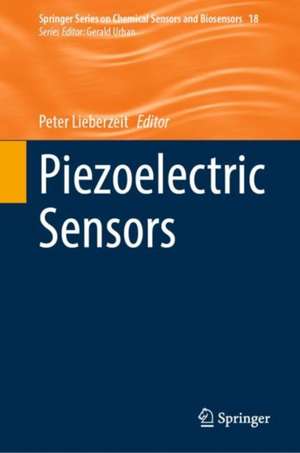Piezoelectric Sensors: Springer Series on Chemical Sensors and Biosensors, cartea 18
Editat de Peter Lieberzeiten Limba Engleză Hardback – 14 apr 2024
Din seria Springer Series on Chemical Sensors and Biosensors
- 9%
 Preț: 1108.89 lei
Preț: 1108.89 lei - 18%
 Preț: 956.03 lei
Preț: 956.03 lei - 18%
 Preț: 1817.85 lei
Preț: 1817.85 lei - 18%
 Preț: 1216.16 lei
Preț: 1216.16 lei - 18%
 Preț: 1216.02 lei
Preț: 1216.02 lei - 18%
 Preț: 1822.57 lei
Preț: 1822.57 lei - 24%
 Preț: 1045.39 lei
Preț: 1045.39 lei - 18%
 Preț: 2484.74 lei
Preț: 2484.74 lei - 18%
 Preț: 2476.54 lei
Preț: 2476.54 lei - 18%
 Preț: 954.77 lei
Preț: 954.77 lei - 18%
 Preț: 955.08 lei
Preț: 955.08 lei - 15%
 Preț: 639.69 lei
Preț: 639.69 lei - 18%
 Preț: 1826.20 lei
Preț: 1826.20 lei - 15%
 Preț: 696.35 lei
Preț: 696.35 lei - 24%
 Preț: 781.37 lei
Preț: 781.37 lei - 18%
 Preț: 1217.90 lei
Preț: 1217.90 lei - 5%
 Preț: 1097.54 lei
Preț: 1097.54 lei
Preț: 2098.81 lei
Preț vechi: 2559.53 lei
-18% Nou
Puncte Express: 3148
Preț estimativ în valută:
401.62€ • 429.46$ • 334.85£
401.62€ • 429.46$ • 334.85£
Carte disponibilă
Livrare economică 27 martie-10 aprilie
Preluare comenzi: 021 569.72.76
Specificații
ISBN-13: 9783031537844
ISBN-10: 303153784X
Pagini: 338
Ilustrații: IX, 338 p. 60 illus., 30 illus. in color.
Dimensiuni: 155 x 235 mm
Greutate: 0.73 kg
Ediția:2024
Editura: Springer International Publishing
Colecția Springer
Seria Springer Series on Chemical Sensors and Biosensors
Locul publicării:Cham, Switzerland
ISBN-10: 303153784X
Pagini: 338
Ilustrații: IX, 338 p. 60 illus., 30 illus. in color.
Dimensiuni: 155 x 235 mm
Greutate: 0.73 kg
Ediția:2024
Editura: Springer International Publishing
Colecția Springer
Seria Springer Series on Chemical Sensors and Biosensors
Locul publicării:Cham, Switzerland
Cuprins
Chapter 1 Quartz Crystal Microbalance-Dissipation Technique for Tracking Dynamic Biomacromolecular Interactions.- Chapter 2 FBAR devices: Fundamentals, Fabrication and Applications.- Chapter 3 Examples of Vibrating MEMS Sensing Physical Parameters for Chemical Gas Detection.- Chapter 4 QCM Strategies for Fundamental and Applied Measurements on particles and formulations.- Chapter 5 Robust QCM-based sensing and assay formats in commercialized systems.- Chapter 6 Biological, Bio-Derived, and Biomimetic Receptors in Mass-Sensitive Sensing.- Chapter 7 Applications and Recent Trends in Surface Acoustic Wave Biosensors.- Chapter 8 FBAR Gas Sensors.- Chapter 9 Resonant Silicon Microcantilevers for Particle and Gas Sensing.
Notă biografică
Peter Lieberzeit has been a Professor for Physical Chemistry at the University of Vienna since 2016. Before that, he had several functions at the Department for Analytical Chemistry, where he became a professor in 2011. He specializes in developing biomimetic recognition matrices for a range of chemical and biological analytes and using them mainly with mass-sensitive transducers. Currently, he has published more than 170 peer-reviewed papers (h=37). He is a member of the Editorial Board of Sensors and Actuators B: Chemical, and Chair of the International Steering Committee of IMCS conferences (International Meeting on Chemical Sensors).
Textul de pe ultima copertă
This book provides a comprehensive overview of piezoelectric sensor devices and instrumentation and their use for chemical and biochemical analysis. Sensors relying on established transducers, such as the quartz crystal microbalance (QCM) and the surface acoustic wave resonator (SAW) are covered, and novel devices like surface transverse wave (STW) resonators, film bulk acoustic resonators (FBAR) as well as non-piezoelectric devices with mass-sensitive properties are presented. As their name implies, such devices respond directly to mass changes on their surfaces and thus address the most fundamental quality of any analytes. First, the book presents the fundamentals of new measuring strategies with these devices. Then, it introduces a variety of chemo- and biosensing application scenarios of these devices. In addition, the book covers both the state-of-the-art of academic research and prospects concerning the commercialization of these sensors. Given its scope, the book is of interest to academics, specialists in industry, and advanced students in the areas of analytical chemistry, rapid analysis, and sensor technology, giving them the unique possibility to familiarize themselves with this chemical sensing strategy. Readers will benefit from the coverage of both cutting-edge research results and applications that help bridge the gap between academia and industry.
Caracteristici
Provides concise overview of piezoelectric sensors Discusses both fundamentals and applications Presents different receptor strategies including biosensors and biomimetic recognition
